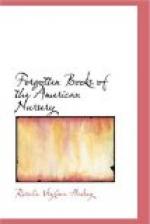The reviewer then passed on to another section of “American abominations” which “seem to have some claim to popularity since they are easily sold.” “These,” continued the anonymous critic, “are works not of amusement—those we shall touch upon later—but of that half-and-half description where instruction blows with a side wind.... Accordingly after impatient investigation of an immense number of little tomes, we are come to the conclusion that they may be briefly classified—firstly, as containing such information as any child in average life who can speak plainly is likely to be possessed of; and secondly, such as when acquired is not worth having.”
To this second class of book the Reverend Mr. Abbott’s “Rollo Books” were unhesitatingly consigned. They were regarded as curiosities for “mere occupation of the eye, and utter stagnation of the thoughts, full of empty minutiae with all the rules of common sense set aside.”
Next the writer considered the style of those Americans who persuaded shillings from English pockets by “ingeniously contrived series which rendered the purchase of a single volume by no means so recommendable as that of all.” The “uncouth phraseology, crack-jack words, and puritan derived words are nationalized and therefore do not permit cavilling,” continued the reviewer, dismayed and disgusted that it was necessary to warn his public, “but their children never did, or perhaps never will, hear any other language; and it is to be hoped they understand it. At all events, we have nothing to do but keep ours from it, believing firmly that early familiarity with refined and beautiful forms ... is one of the greatest safeguards against evil, if not necessary to good.”
However, the critic did not close his article without a good word for those ladies in whose books we ourselves have found merit. “Their works of amusement” he considered admirable, “when not laden with more religion than the tale can hold in solution. Miss Sedgwick takes a high place for powers of description and traits of nature, though her language is so studded with Americanisms as much to mar the pleasure and perplex the mind of an English reader. Besides this lady, Mrs. Sigourney and Mrs. Seba Smith may be mentioned. The former, especially, to all other gifts adds a refinement, and nationality of subject, with a knowledge of life, which some of her poetical pieces led us to expect. Indeed the little Americans have little occasion to go begging to the history or tradition of other nations for topics of interest.”
The “Westminster Review” of eighteen hundred and forty was also in doubt “whether all this Americanism [such as Parley’s ‘Tales’ contained] is desirable for English children, were it,” writes the critic, “only for them we keep the ‘pure well of English undefiled,’ and cannot at all admire the improvements which it pleases that go-ahead nation to claim the right of making in our common tongue: unwisely enough as regards themselves, we think, for one of the elements in the power of a nation is the wide spread of its language.”




